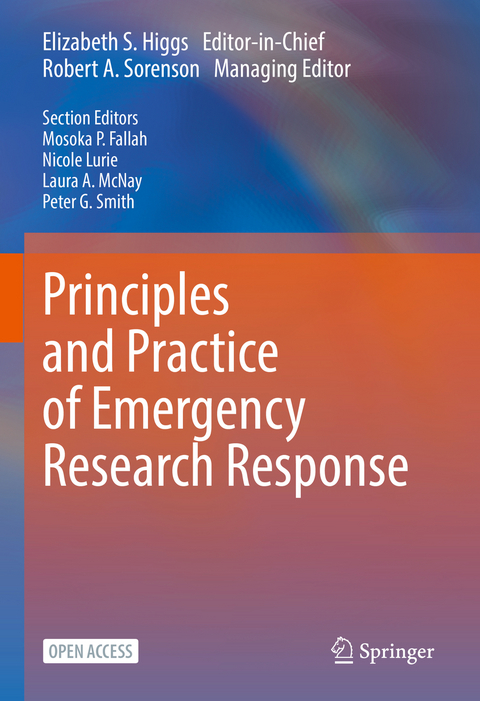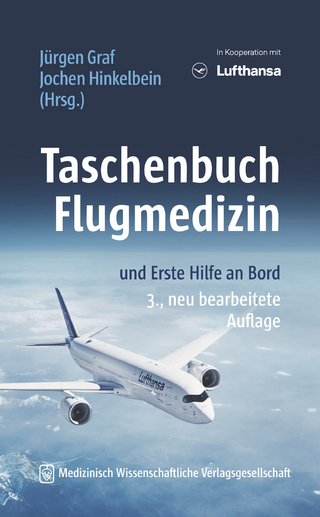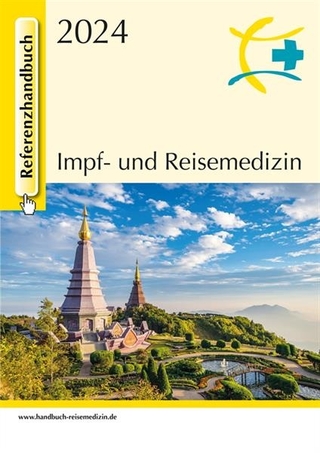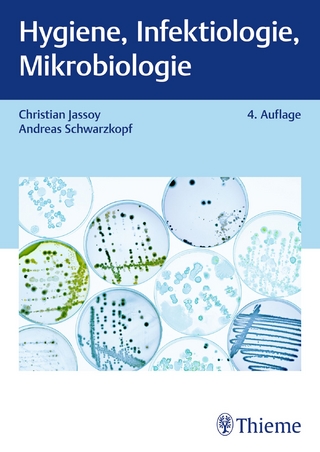
Principles and Practice of Emergency Research Response
Springer International Publishing (Verlag)
978-3-031-48407-0 (ISBN)
lt;b>Dr. Elizabeth S. Higgs, MD, MIA, DTMH, is a global health science advisor, clinical scientist, and pandemic preparedness research response policy expert working in the Division of Clinical Research at the U.S. National Institute of Allergy and Infectious Diseases (NIAID), National Institutes of Health (NIH). Throughout her career, Dr. Higgs has contributed to critical health emergencies, including H1N1, Ebola outbreaks in West Africa and the DRC, the 2018 Nipah outbreak in Kerala, India, mpox, and SARS-CoV-2, demonstrating that regulatory-level clinical trials during health emergencies are possible and contribute to medical countermeasures that accelerate the end of outbreaks.
Known for global health diplomacy while fostering interagency and multilateral collaborations, she actively engages in strategic global health security initiatives and policy groups, making impactful contributions to key policy documents such as the World Bank's Money and Microbes, the G7 Clinical Trials Charter, and the U.S. National Biosecurity Strategy and Global Health Security Strategy.
Her passions include nurturing sustainable clinical research capacity in low- and middle-income countries and promoting cooperative global clinical trial networks. With a foundation in internal medicine and infectious diseases, Dr. Higgs holds a doctorate in medicine, a master's degree in international affairs, an interdisciplinary bachelor's degree in bioethics, and a Diploma in Tropical Medicine and Hygiene. Through her commitment to response research, she is dedicated to safeguarding and enhancing the well-being of people worldwide in the face of health emergencies caused by emerging infectious disease.
Robert A. Sorenson has worked with the NIAID Division of Clinical Research on infectious disease emergency response policy, especially urgent clinical research response to emerging pathogens, since 2016, after having worked on global health policy issues at the U.S. Department of State since 2009.
Mr. Sorenson was a Foreign and Civil Service Officer at State for 33 years. After 2001, when family circumstances curtailed his overseas career, he primarily served in the Bureau of Oceans, Environment, and Science, including terms as Deputy Director of the Offices of International Health and Biodefense, Environmental Policy, and Ecology and Terrestrial Conservation. His overseas experience, starting in 1986, included political, consular, environmental, and deputy chief of mission positions in Manila, Moscow, Osaka, Skopje, Tashkent, and Tirana, as well as several temporary duty assignments in crisis spots. He retired from State on New Year's Eve, 2017 and has since been a contractor with NIAID.
As managing editor of PPERR, Mr. Sorenson revived and updated his professional editorial experience, which dated to 1981-1986. He was a National Fellow at the Hoover Institution in 1999-2000 and has an MA in Russian literature from Cornell University and a BA from St. Olaf College
Nicole Lurie, M.D., M.S.P.H., is Executive Director for Preparedness and Response at the Coalition for Epidemic Preparedness Innovations (CEPI) and Director of CEPI-US. She is also a Senior Lecturer at Harvard Medical School and Professor of Medicine at George Washington University School of Medicine.
She served an eight-year term as Assistant Secretary for Preparedness and Response at the U.S. Department of Health and Human Services from 2009 to 2017. In that role she led the HHS response to numerous public health emergencies, ranging from infectious disease to natural and man-made disasters, and is responsible for many innovations in emergency preparedness and response.
Prior to federal service, she was the Paul O'Neill Professor
Section I. Pandemic Preparedness and Research Response: A Necessary New Field.- 1. Introduction.- 2. Clinical Research on Infectious Diseases.- 3. Guiding Principles for Emergency Research Response.- Section II. Norms for Emergency Research Response.- 4. Ethics of Pandemic Research.- 4.1. In Practice: Vaccine Efficacy and Safety Testing - An Ethical Case for Individual Randomization.- 4.2. In Practice: Research Ethics Committee Review in Public Health Emergencies.- 5. Health Emergency Research amid Global Inequities.- 6. Meeting Regulatory Criteria and Seeking Licensure.- 7. Research, Sample, and Data Sharing During Outbreaks, Pandemics, and Beyond.- Section III. Preparedness for Emergency Research Response.- 8. Building Biomedical Research Capacity in Low- and Middle-Income Countries.- 9. Laboratory Needs for Research Response.- 10. Understanding How and Where Pathogens Emerge.- 11. Accelerating Diagnostic Innovation for Pandemic Control.- 12. Vaccine Candidates for Novel Pathogens.-12.1. In Focus: Novel Manufacturing Platforms for Pandemic Preparedness and Emergency Response.- 13. Accelerating Vaccine Development.- 14. Accelerating Development of Therapeutics for Preparedness, Response, and a More Secure World.- 14.1. In Practice: The RECOVERY Trial.- Section IV. Research Response.- 15. ACTIV: A U.S. Public-Private Partnership Responds to COVID-19.- 15.1. In Practice: Leveraging an Integrated National Health System for Research Response.- 16. Challenges for Emergency Research Interventions in Fragile, Weak, and Failed Nation States.- 16.1. In Practice: Responding to an Infectious Disease Outbreak amid a Humanitarian Emergency.- 17. Integrating Clinical Research into Ebola Response: Liberia Case Study.- 17.1. In Practice: Integration of Clinical Research and Patient Care in the DRC PALM Ebola Therapeutics Trial.- 18. Good Participatory Practice. Social Mobilization, Communications, and Community Engagement.- 18.1. In Practice: Building Community Engagement for Clinical Research Response.- 18.2. In Practice: Adapting Social Analytics for Research Response.- 19. Understanding and Reporting the Natural History of an Infectious Disease.- 20. Turning Research Results into Clinical Practice Guidelines in Public Health Emergencies.- Section V. Methodology for Research Response.- 21. Epidemiological Research in the Setting of Outbreak Response.- 21.1. In Focus: The Impact and Mechanisms of Superspreading.- 22. Vaccine Trial Designs.- 22.1. In Focus: Ring Trial Design.- 23. Data and Safety Monitoring of Clinical Trials During Public Health Emergencies.- 23.1. In Practice: Monitoring the PALM Ebola Therapeutics Study in the Democratic Republic of the Congo.- 24. Mathematical Modeling for Emergency Response.- 25. Models in the COVID-19 Pandemic.- 25.1. Case Study: Modeling Fractional-Dose Emergency Vaccination Campaigns for Yellow Fever.- 26. Social Science Evidence for Outbreak and Pandemic Response.- Section VI. Governance, Institutions, and Partnerships.- 27. A Global Framework for Research Preparedness and Response.- 28. Financing Emergency Research Response during Infectious Disease Outbreaks.- 29. International Collaboration to Advance Research Preparedness and Response.- 30. Organizational Partnerships for Preparedness and Response to Emerging and Re-Emerging Infectious Diseases.- 30.1. In Focus: Research and Medical Humanitarian NGOs.- 30.2. In Practice: Building and Maintaining Preparedness for a Rapid Research Response in Indonesia.- Section VII. Research Operations.- 31. Operational Recommendations for Streamlining Emergency Research Responses to Pandemics.- 32. Launching a Clinical Research Operation.- 32.1. In Practice: Clinical Research Communications During an Outbreak.- 32.2. In Focus: Clinical Trial Insurance and Indemnification.- 33. Ethical Review of Research During an Emergency Response.- 33.1. In Practice: Ethical Review During Emergencies - The Liberian Experience.- 33.2. In Practice: Independent Monitoring of Emergency Response Clinical Trials.- 33.3. In Practice: Capacity Building for Research Ethics Review in Low- and Middle-Income Countries.- 34. Information and Communications Technology to Support Research Low-Resource Settings.- 35. Data Management in Emergency Response Research.- 36. Safety and Pharmacovigilance in Emergency Research Response.- 37. Supply and Logistics for Clinical Research in Low-Resource Settings.- 38. Pharmaceutical Management.- 39. Cold Chain and Electrical Power for Emergency Research Response.- 40. Selecting and Opening a Clinical Research Site in a Low-Resource Setting.- 40.1. In Practice: Improving Patient Care in the Field - The CUBE Isolation Unit.- 41. Management of Security for Clinical Trials During Emergencies.- 42. Locally Hired Staff for Clinical Research Sites in Low-Resource Settings.
| Erscheinungsdatum | 06.09.2024 |
|---|---|
| Mitarbeit |
Chef-Herausgeber: Elizabeth S. Higgs |
| Zusatzinfo | LXII, 1100 p. 226 illus., 222 illus. in color. |
| Verlagsort | Cham |
| Sprache | englisch |
| Maße | 178 x 254 mm |
| Themenwelt | Medizin / Pharmazie ► Medizinische Fachgebiete ► Mikrobiologie / Infektologie / Reisemedizin |
| Medizin / Pharmazie ► Studium | |
| Naturwissenschaften ► Biologie ► Mikrobiologie / Immunologie | |
| Schlagworte | Bioethics • clinical research • Covid-19 • Ebola • emergency response • Global Health • Health Security • Health system • Humanitarian response • international assistance • medical NGO • ODA • open access • Preparation • Public Health • SARS-CoV-2 • zoonotic |
| ISBN-10 | 3-031-48407-X / 303148407X |
| ISBN-13 | 978-3-031-48407-0 / 9783031484070 |
| Zustand | Neuware |
| Haben Sie eine Frage zum Produkt? |
aus dem Bereich


